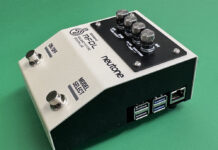Jimi Hendrix, David Gilmour, Jeff Beck and More: 10 Surprising Guitarist Guest-Star Spots
Everyone knows about Eric Clapton’s performance on the Beatles’ “While My Guitar Gently Weeps.”
And Eddie Van Halen’s solo on Michael Jackson’s “Beat It”? Fantastic, yes, but do we really need to revisit it again?
Instead, we decided to highlight 10 less-celebrated guitar guest spots from the annals of rock history.
Steve Howe “Innuendo”—Queen Innuendo (1991)
Yes guitarist Steve Howe had been a friend of Queen lead singer Freddie Mercury for several years when he joined the band on this cut. Howe had gone to visit Queen in the studio after he’d heard through a mutual acquaintance that the group was working on its new album. Upon hearing “Innuendo,” he said, “I was fucking blown away.”
When they asked him to play on it, he thought they’d lost their minds. Eventually, they convinced him to play “some crazy Spanish guitar flying around over the top,” Howe recalled. It took him hours to work something around the song’s structure, but the results speak for themselves.
Jerry Garcia “I Used to be a King”—Graham Nash Songs for Beginners (1971)
This stand-out track from Nash’s solo debut, Songs for Beginners, is one of several songs on the album written about his breakup with Joni Mitchell. Jerry Garcia provides some beautiful, weeping pedal-steel playing on the verses before cutting loose on the solo, where his heart-tugging lines provide an emotional connection equal to Nash’s own aching vocals. Surprisingly, Garcia considered himself a novice on the instrument, but his work here is a testament to his musical sensibilities, tone and touch.
Mick Jones “Big Tears”—Elvis Costello Taking Liberties (1980)
Never one for guitar solos, Costello liked to play the riffs and leave the fancy work to his keyboardist, Steve Nieve. “Big Tears,” on the other hand, is an anthemic track from his 1978 This Year’s Model period, and it benefits from the guitar handiwork of the Clash’s Mick Jones.
Granted, Jones doesn’t get to do much after the crunchy opening riff except bend notes and provide some melodic filigree, but his sinewy lines give the music a toughness that matches Costello’s lyrics and gruff vocals. “Big Tears” was released on Costello’s odds-and-sods Taking Liberties collection but can be found these days on deluxe editions of This Year’s Model.
Pete Townshend “Slow Burn”—David Bowie Heathen (2002)
Townshend had previously performed on Bowie’s “Because You’re Young,” from 1980’s Scary Monsters (And Super Creeps). They teamed up again for this cut from Heathen, an album that also saw Bowie work with Foo Fighters guitarist Dave Grohl. Townshend’s soloing is tough, ballsy and inspired, adding a fair amount of smolder appropriate to the song and its title.
Jimi Hendrix “Old Times Good Times”—Stephen Stills Stephen Stills (1970)
Stephen Stills is the only album to which both Eric Clapton and Jimi Hendrix contributed guitar work, and it features a cross-section of the great musicians of the period, including Ringo Starr, Booker T. Jones, John Sebastian, Cass Elliott and Stills’ CSN bandmates Graham Nash and David Crosby. Hendrix died before the album was released. “That was the song I needed to finish the album,” Stills said of “Old Times Good Times.” “We started doing something else, so we made some demos and then went out…never to return, unfortunately.”
Paul Weller “Champagne Supernova”—Oasis (What’s the Story) Morning Glory? (1996)
Paul Weller and Oasis guitarist Noel Gallagher have been mates for a long time and played on each other’s records. Weller’s turn on “Champagne Supernova,” the group’s monster hit from 1995, isn’t too surprising, given his and Gallagher’s friendship, but it came about in an apparently offhand way.
The two showed up at the studio one afternoon during the third week of mixing the album at Orinoco studios. Producer Owen Morris recalls nursing a hangover when Gallagher and Weller turned up. “Weller had a white Gibson SG and a Vox AC30 which he just plugged into and had his sound,” he said. “And he just played half a dozen solos. Then he improvised the whistle on the outro of ‘Champagne Supernova,’ and improvised the ‘ooh’ backing vocals.”
David Gilmour “Give Blood”—Pete Townshend White City: A Novel (1986)
The opening track for Townshend’s fourth album, “Give Blood” was written quickly as a song for Gilmour, bassist Pino Palladino and drummer Simon Phillips to perform on. Gilmour’s arpeggiating guitar lines are mesmerizing and give the song a seriously funky driving element.
“I brought in Simon Phillips, Pino Palladino and David Gilmour simply because I wanted to see my three favorite musicians of the time playing on something,” Townshend says. “And, in fact, I didn’t have a song for them to work on, and sat down very, very quickly and rifled through a box of stuff, said to Dave, ‘Do one of those kind of ricky-ticky-ricky-ticky things, and I’ll shout “Give Blood!” in the microphone every five minutes and let’s see what happens.’ And that’s what happened. Then I constructed the song around what they did.”
Johnny Marr “Sexuality”—Billy Bragg Don’t Try This at Home (1991)
Long before the queer revolution found social acceptance, Billy Bragg had a hit with this sex-positive, anti-homophobia track, co-written with Marr. The guitarist, then bouncing around in the aftermath of the Smiths, contributed his dense and tuneful trademark riffage.
Marr recalled,“That was written by the two of us when I heard him singing the word sexuality with that five-note tune and this reggae skank, for want of a better word, on the one chord of G. So I said, ‘Sing that onto a cassette and let me finish it?’ ” Bragg complied, and the result was one of his finest moments on record.
Mark Knopfler “Jokerman”—Bob Dylan Infidels (1983)
Dylan hired Knopfler to produce Infidels, the album that marked his return to secular music after a period of writing songs that reflected his newfound Christian faith. Knopfler assembled an ace group that included the rhythm team of drummer Sly Dunbar and bassist Robbie Shakespeare as well as former Rolling Stones guitarist Mick Taylor, whose emotive slide work provided the perfect complement to Knopfler’s own expressive picking.
On “Jokerman,” the album’s lead track, Knopfler fills the gaps between Dylan’s lyrics with melodic lines that raise the song’s emotional intensity without ever overpowering Dylan’s vocal.
Jeff Beck “Blaze of Glory”—Jon Bon Jovi Young Guns II (1990)
Well, it doesn’t get more surprising than this: Jeff Beck on a Jon Bon Jovi theme song for a Brat Pack western. Beck’s solo is 30 seconds of blazing virtuosity, on which he combines harmonics, slide, fingerpicking and whammy-bar magic, particularly on the final harmonic, where he uses the twang bar to bend it into a traditional movie-western motif.
Source: www.guitarworld.com








